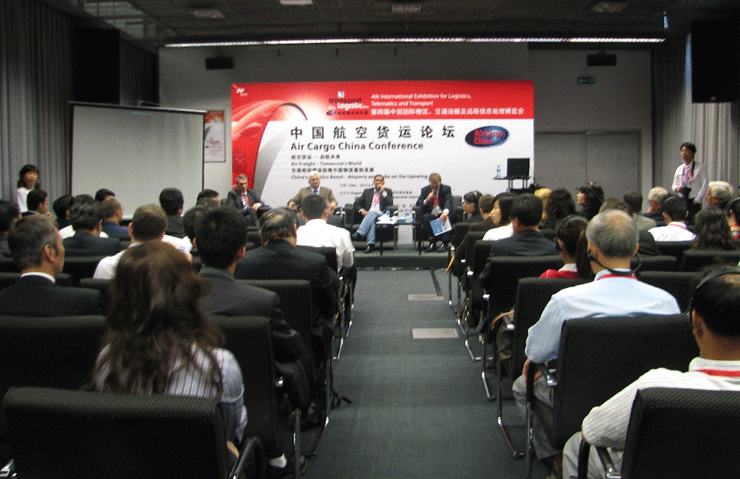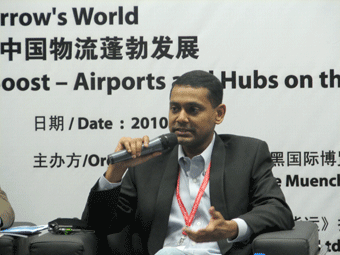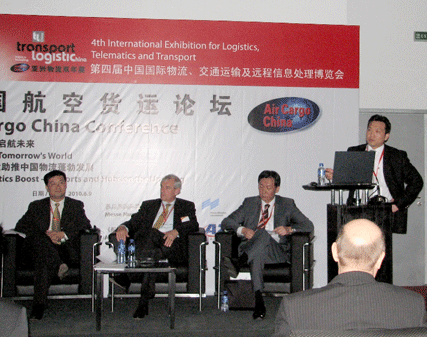Munich China Show A Non-Starter

The people who attended Transport
Logistik in China, a trade show imported from Munich, may have found a
few scattered reasons to feel positive about the overall multi-modal experience—these
days, even a trip to action-packed China is reason enough—but comments
from the recent encounter indicate that the air cargo portion of the event
was, at worst, a bust and at best, disappointing.
“Shanghai was nothing special—some
carriers, but not a big scene at all.
“The air cargo part was extremely
small, just half of a hall.
“It took me 15 minutes to walk through
the floor and see the stands.
“Nothing really outstanding.
“Also, the bigger air cargo carriers
did not show up.
“ACMI operators like Atlas & World
were present with their own booth.
“We had some good meetings with some
forwarders, but I could have had these meetings without the fair.
“For me, this is the last time I will
go to Shanghai for this event.
“Transport Logistik China is not comparable
to what happens every other year in MUC.
“Munich is truly unique—at a
different level from an exhibitor point of view.”
The question that still remains unanswered
is that, with so many excellent international transportation conferences
held annually in China, why one from Munich?
The 4th International Exhibition for Logistics,
Telematics and Transport took place June 8-10, 2010, at the Shanghai New
International Expo Centre and attracted 13,500 trade visitors from 67
countries.
There was a 20 percent rise in visitors
since the last Transport Logistik China in 2008, which is reflective of
the rising demand for transport and logistics excellence, especially in
the Asian market. This rise occurred despite a severe downturn in the
sector in 2009.
“Transport Logistik China has come
at just the right place and time, as business is starting to pick up again,”
said Eugen Egetenmeir, Managing Director of Messe München International
(MMI) and organizer of the event.
The Air Cargo China exhibition, which was
held as part of Transport Logistik China 2010, attracted over 50 of the
world’s leading airlines, airports, logistics hubs and aircraft
manufacturers. In addition to the exhibition, the Air Cargo China Conference
also served as a platform for discussing the latest developments and trends
in the air cargo business with special reference to the growth market
of Asia.
International CEOs from the air cargo business
gave an in-depth overview of the trends in the industry in two discussion
panels, pointing specifically to the potential of the Asian market.
 Mr.
Sathis Manoharen, Head of Cargo for AirAsia and AirAsia X, Malaysia, introduced
a newcomer in tomorrow’s air cargo market—the Low-Cost Cargo
Carrier. Mr.
Sathis Manoharen, Head of Cargo for AirAsia and AirAsia X, Malaysia, introduced
a newcomer in tomorrow’s air cargo market—the Low-Cost Cargo
Carrier.
Both the regional AirAsia and long-haul
AirAsia X airlines decided that the contribution to the bottom line provided
by cargo was not to be ignored, even though a fast turnaround time is
essential to the operation of the low-cost model.
“A low-cost airline could offer air
cargo services at competitive rates, and its key advantages include competitive
pricing, high frequencies, low cost in the logistics supply chain, service
to both primary and secondary markets and finally, no fuel, security and
etc. surcharges,” Mr. Manoharen said.
“However, here are also challenges
that a low-cost airline has to face, and some experts say it’s no
way!”
“The low-cost airline not only has
to overcome the limitations inherent in short turn-around time, web-based
cargo booking and tracing system, and lack of trans-shipment facilities
involved in handling perishables, but also has to think about how to interline
with other cargo carriers and harmonize passenger and cargo operations,”
Mr. Manoharen added.
 Mr
Robert Song, (at the podium) Executive Vice President of AirBridge Cargo
Airlines in China, introduced “Benefits of a Network Strategy.” Mr
Robert Song, (at the podium) Executive Vice President of AirBridge Cargo
Airlines in China, introduced “Benefits of a Network Strategy.”
AirBridge Cargo Airlines is now operating
a network strategy connecting China to a worldwide network through a hub
in Moscow—a strategy that is enabling this freighter airline to
move away from just offering point-to-point cargo transportation.
“Moscow is an advantageous geographical
location between Europe and Asia, and the largest growing consumption
market in Russia. It also owns an airport-SVO free from congestion and
open for development and expansion.” said Mr. Song.
“Introducing hub operations in SVO
in 2009 resulted in significant growth of cargo throughput, and allowed
ABC to realize efficiencies of scale and geography without extension in
total transit time.”
As to China, Mr. Song commented, “Investment
going west, logistics to follow.”
“Congestion in and around China coastal
airports will not ease, but worsen in coming years as more passenger flights
will be introduced to cater to the needs of traveling public with higher
disposable income.
“Favorable policies in Central China
encourage factories (and therefore freighter operators) to explore Western
China as the next base of export production and logistics’ development.”
Mr. Thomas Hoang, Regional Director of Boeing,
shared a brief update of Boeing's latest findings and statistics relating
to the China market.
“The decline in world air cargo traffic
in 2008 and 2009 resulted in 6years of lost growth.
“While in the first three months of
2010, the business grew 22.6 percent relative to that of 2009.
“And China air cargo market will continue
to be of significant importance, as its forecasted economic growth continues
to lead the world.”
Other speakers at the panels included Mr.
Jason Teo, Infineon Technologies and Chairman of the Transported Asset
Protection Association Asia (TAPA); Mr. Gao Pei, Executive Deputy General
Manager of China Cargo Airlines; and Mr. Enno Osinga, Senior Vice President
Cargo of Amsterdam Airport Schiphol.
David/Flossie |



